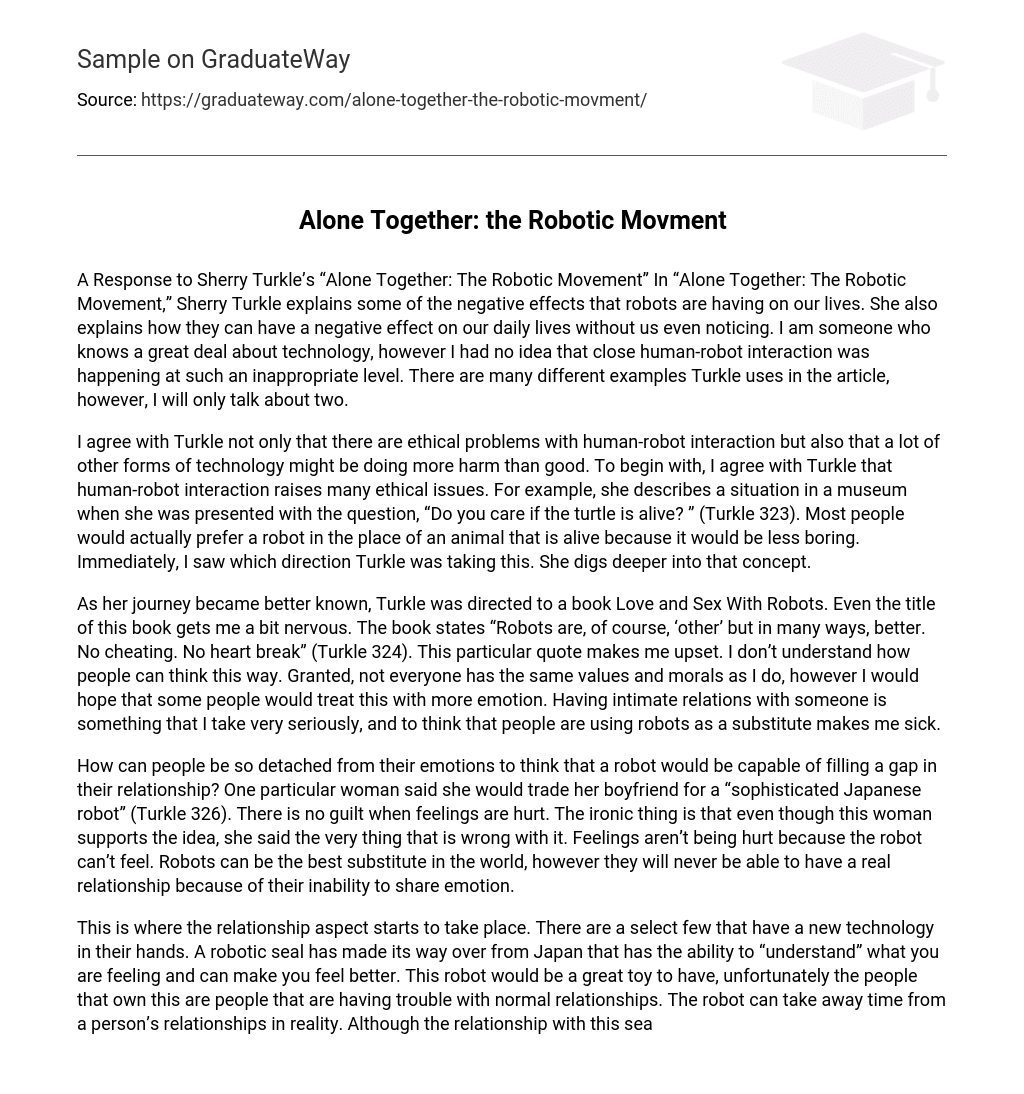Sherry Turkle’s article “Alone Together: The Robotic Movement” delves into the detrimental impact of robots on our lives, highlighting their capacity to subtly disrupt our daily routines. While I pride myself on being knowledgeable about technology, I was taken aback by the degree to which humans are excessively engaging with robots. Turkle provides ample instances in her piece, but I will focus on two particular examples.
The perspective of Turkle on ethical concerns about human-robot interaction and other forms of technology that may have negative consequences is agreed upon. Turkle shares an incident in a museum where she was asked if the life of a turtle mattered to her (Turkle 323). It is noted that people often prefer robots over live animals because they believe it would be more captivating. This particular example serves as a foundation for Turkle to explore the topic further.
Turkle was directed to a book called Love and Sex With Robots, which made me a bit nervous just from the title. The book argues that robots are “other” but also better in many ways, as there is no cheating or heartbreak involved (Turkle 324). This quote particularly upsets me, as I can’t comprehend how people can hold such beliefs. Although I recognize that not everyone shares my values and morals, I hope that some individuals would approach this topic with more emotional depth. Personally, I consider intimate relationships to be a serious matter, and the concept of using robots as substitutes disgusts me.
Some individuals are so emotionally detached that they believe a robot could fill the void in their relationship. A specific woman expressed her willingness to exchange her boyfriend for a “sophisticated Japanese robot” (Turkle 326). Surprisingly, she inadvertently highlighted the flaw in this concept by acknowledging that feelings are not hurt. This woman’s support for the idea contradicts its very essence, as robots lack the ability to experience emotions. While robots may be exceptional substitutes, their inability to share emotions prevents them from establishing genuine relationships.
This is where the relationship aspect begins. Only a few people have access to a new technology – a robotic seal from Japan. This unique robot has the capability to “comprehend” your emotions and provide comfort. While possessing such a robot would be desirable, unfortunately, it is primarily owned by individuals struggling with conventional relationships. Consequently, it diverts time and attention away from their real-life relationships. While the bond with this robotic seal is remarkable, relationships with friends and family suffer as a result.
I understand the reasons behind this phenomenon. Robots, lacking emotions, cannot pass judgment, provoke guilt, or demand effort to sustain relationships like humans do. However, facing the ups and downs of life is an essential aspect of our humanity. Moreover, I concur with Turkle’s viewpoint that technology is gradually dominating our existence without us fully realizing it. Almost everyone possesses a mobile phone nowadays. Whether we are engaged in texting, checking emails, or playing games like Angry Birds, we become deeply immersed in this digital realm. Despite our unawareness, a significant number of us have become addicted to these devices.
Despite the promised freedom, modern-day cell phones have worsened this issue for humans. Turkle (330) argues that technology has simultaneously bound and liberated us. These devices allow constant connectivity even during other tasks. For example, I am aware of working parents who bring their phones home with them. Moreover, there is a noticeable change in behavior among most teenagers I know, including myself, as we prefer texting over phone calls. This preference raises the question: Is it simpler to avoid face-to-face interaction?
The entertainment industry has recognized this pattern, and now most movies and television shows feature scenes in which the entire family is shown holding both a fork and a cell phone. This has become the new standard, even when watching a movie together as a family. We are consistently being targeted to enhance our movie-watching experience with technologies such as 3D TVs and Blu-Ray DVDs. Growing up during this time period, these advancements have also progressed alongside me, and I am unfamiliar with any other way of life. However, I do agree with Turkle on many of her points, particularly her observation that platforms like Facebook have had a negative impact on our connections to the outside world beyond our screens.
Although I don’t agree with the statement, I find Facebook to be a convenient platform for staying connected with great people. However, families should be careful not to get too immersed in this constantly changing world. Like Turkle’s perspective suggests, I acknowledge the ethical issues that arise when individuals form intimate relationships with robots. Moreover, it has become clear to me that humans are struggling to keep up with the rapid advancements in cellphone technology, which could lead to more harm than good. Despite being aware of the possible negative outcomes, I have no intention of changing my habits based on this newfound knowledge.
Instead of choosing to play a game on my phone in a waiting room, it may be advantageous for me to put my phone aside and engage in a conversation with a stranger.
(Source: Turkle, Sherry. “Alone Together: The Robotic Movement” Alone Together: Why We Expect More from Technology and Less From Each Other 2011: pp. 3-13. Rpt. in Writing in the Disciplines. Ed. Mary Lynch Kennedy and William J. Kennedy. Boston: Pearson Education, Inc., 2012. 322-30. Print.)





